What do you think of when you hear the term “content marketing?” Is it a blog post? A TikTok video? Maybe it’s a 10-page guide you downloaded to help plan a cross-country move.
If so, you’d be right. It’s all these things, and a whole lot more. But most importantly for brands and marketers, content marketing is a versatile, accessible, proven strategy that can help you generate trust, awareness, and leads at an incredible scale…without spending a ton of money.
Read this guide, and you’ll learn how to use content marketing for your own business. We’ll explain what it is, how to get started, and share a bunch of tips and examples to help you be successful right out of the gate.
Contents
- What is content marketing?
- Benefits of content marketing
- Content marketing challenges
- How content marketing works
- Common types of content marketing
- How to build a content marketing strategy
- 14 content marketing tips (with examples)
- Best tools for content marketing
- Content marketing FAQs
What is content marketing?
Content marketing is a strategic approach to creating and sharing valuable, relevant content that attracts and engages a target audience. Instead of pushing products directly, it builds trust and credibility by providing information, education, or entertainment that solves customer problems.
Content marketing is considered an inbound marketing technique. It’s designed to be an organic part of someone’s experience, like providing an answer to a question they’ve asked.

Compare that with outbound advertising strategies like a cold call, which are often meant to interrupt an experience.
Using content marketing can drive leads directly and help support other marketing activities. Say you run a car dealership, and someone reads your blog post about the best automotive finance options. Then one of your Google Ads shows up while they’re searching for cars. They’ll recognize and potentially trust your brand more, increasing the likelihood that they click on your ad.
💡Content marketing is a great tactic to drive visitors to your website. Get more in 25 Ways to Increase Traffic to Your Website.
Benefits of content marketing
Brands that build a successful content marketing strategy regularly outperform their non-content-using competitors. Here’s why that happens.
Increases brand awareness
A healthy content marketing program places your brand in front of more people more often. That’s why 87% of marketers say content has helped them increase their brand awareness.
Each blog article, social media post, and email you share increases your online footprint. This effect is compounded by the network effect, especially in social media.
Here’s how that works. Say you publish a unique guide on solving shin splints for runners.

It’ll solidify you as an expert in your current audience’s eyes and increase your presence as they share it in their networks. And as their connections start following you, the network compounds.
Improves the quality and quantity of leads
76% of marketers say content marketing helps them generate more leads. It does this by engaging people across the whole buyer’s journey. For example, when someone is just beginning to think about a problem, a helpful blog post will attract them, whereas an overt promotional ad may not be the right time.
Additionally, 70% of marketers say content marketing delivers “high-quality” leads. That’s because you can design content that helps people self-qualify as a good-fit lead. If your selling proposition is premium service for discerning users, your content can filter out extreme value shoppers who won’t buy what you sell.
Enhances your credibility
A disheartening 96% of people say they don’t trust ads. But 64% of buyers say they do trust brands that create educational content. Oh, and that trust jumps to 73% a week after consuming that content.
Have you ever had a mechanic explain something technical to you in terms you could understand, and then prove what they said with examples? If so, you probably trusted that professional a lot more after the interaction. And that’s what content marketing can do for your business, only on a much larger scale.

Content marketing challenges
Content is one of your best bets for long-term growth and lead generation. But it’s not all smooth sailing. Quickly evolving tech, shifts in search, and AI-powered competitors have churned up the waters.
Keep an eye out for these content marketing challenges:
- Constant SERP shuffling: Google continues to roll out new core updates, and each one seems to change the rules for ranking on search engine results pages. Your best bet here is to watch how other websites in your niche fare and stay up to date on what factors still help you land on page one.
- AI Overviews swiping traffic: Google’s AI Overviews are accelerating the trend of zero-click search (58% of searches result in zero clicks). You can claw back some of that lost referral traffic by optimizing for both AI Overviews and AI search engines like Perplexity and Gemini.
- Increased AI-powered competition: Generative AI tools let brands scale content production at an incredible rate, and it’s getting more popular to do so (around 60% of US businesses say they use generative AI to keep up their social media content schedule). Your goal here shouldn’t be an arms race to the quality bottom. Instead, look for ways to make fewer assets stand out more. These ideas from marketing pros will help.
How content marketing works
Content marketing works by engaging an audience with helpful and entertaining content to gain their awareness and build their trust.
There are several steps that commonly happen during the content marketing funnel:
- Attract: Get the attention of your target audience in the places they spend time using content that helps and educates rather than disrupts.
- Engage: Connect with potential buyers on channels like social media to continue conversations and further build relationships.
- Nurture: Motivate prospects through a designated buying journey with more personalized content assets like newsletters and email drip campaigns.
- Convert: Turn followers into customers with conversion-focused content like product comparisons.
Common types of content marketing (with examples)
Once you start looking for it, you’ll see dozens of types of content marketing. The content types we’ve listed here tend to do most of the heavy lifting for many brands.
Long-form content
As the name suggests, long-form content typically includes larger assets, often with higher word counts. Blog posts, ebooks, and case studies all belong to this category.
This type of content lets you focus on one or a few related SEO keywords. Or you can use it to explain a completely new idea in a thought leadership-style post.
Have a look at this blog post about retiring in your 50s. It’s 2000 words long and ranks for a group of keywords related to retiring early, making it well-targeted to a middle-aged, financially successful audience.

Social media posts
Social media is a versatile content marketing platform. You use it to promote long-form content, share insights directly, gather and use user-generated content, and so much more. And since it’s a two-way communication channel, you can also engage with your audience directly.
You also have a lot of flexibility in the types of content you post on social media. This physical therapist is building an audience with simple tutorials on staying healthy and active.

Notice again how he’s narrowed the target audience down to runners. That’s a great way to make sure your content is relevant to your ideal customer.
Email content marketing can take a few forms. Newsletters are incredibly popular. So are email nurture campaigns that keep people interested who aren’t ready to buy right away.
Here’s a monthly newsletter from a local handyman service. It’s simple, timely, and has links to other resources and promotions.

The winning ingredient here is consistency. A monthly newsletter, sent at the same time each month, becomes very noticeable in an inbox.
Podcasts
Podcasts have been around for a while, but they’ve really made a splash for content marketers in the last couple of years.
The great thing about this type of content marketing is that you can approach it in several ways. You can create your own podcast, be a guest on someone else’s, or sponsor a show that’s in your niche.
Outdoor retailer REI produces a regular podcast featuring stories from people doing cool stuff in the wild.
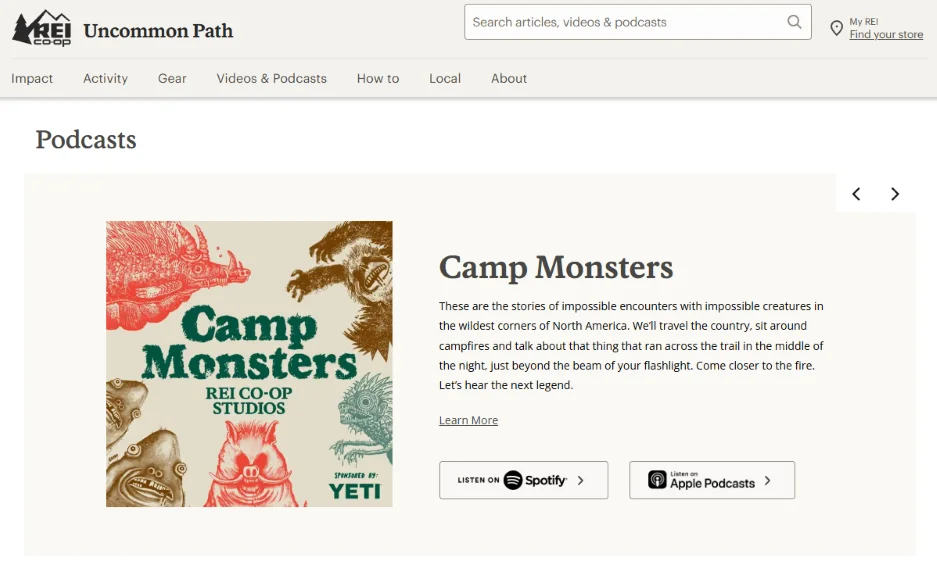
If this sounds good to you, try searching for podcasts produced in your town. They could be a good place to get featured.
How to build a content marketing strategy
Like every marketing project, you’ll get much farther with content marketing if you have a roadmap. It needs to include a starting point, a destination, and plans on how you’ll achieve your marketing goals.
We’ve created a comprehensive guide to help you develop a complete content marketing strategy. But for now, here is the scaffolding of a successful content marketing plan.
- Set goals: Start by deciding if it’s traffic, conversions, awareness, or some other marketing metric you’re after. Set a SMART goal that’s specific and time-bound (e.g., acquire 100 newsletter subscribers within 90 days).
- Define your audience: Settle on as specific a target audience as possible. Consider demographics, interests, behavior, and favorite platforms for learning.
- Conduct keyword and topic research: Use keyword research to identify terms your SEO content will target, and consider common customer questions to round out your topic list.
- Build a calendar: Lay out the topics and types of content you’ll produce over the next weeks or months. Focus on quality, then consistency, then quantity.
- Create content: Start producing blog posts, videos, and newsletters specific to the channel you’ve chosen. Make it relevant to your target audience.
- Measure and optimize: Track marketing KPIs like views, engagement, click-through rate, and so on. Identify which content types and platforms have the most impact and focus on them.
14 content marketing tips
Now that we have a solid foundation, let’s work on making sure your content marketing strategy delivers the best return possible.
1. Think distribution first
It doesn’t matter how amazing your content is; it won’t help your business grow if no one sees it. That’s why you have to ask “what’s the distribution plan?” for every bit of copy or video you create.
For SEO blog posts, the answer is straightforward. The core distribution plan is to optimize the post so people find it on search engines.
For a thought leadership post or a new data study that no one is specifically searching for, you’ll need a more active distribution plan. That may include:
- Posting it on social media
- Asking influencers to share it with their audiences
- Getting it picked up by a relevant news outlet
- Sending it to your email subscribers

Social media is a natural fit for distributing blog posts like this one.
2. Target accessible keywords
When you’re choosing which keywords to target with content, you’ll need to look at both their search volume and keyword difficulty.
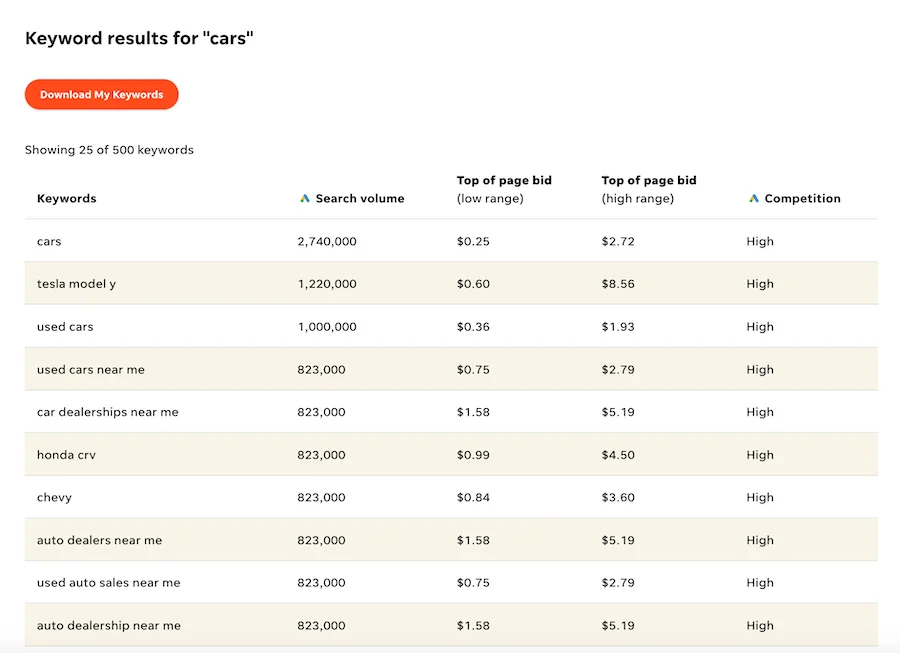
Search volume refers to the number of times people search for a term within a given month. The higher that number, the more people will see your content if you rank.
Keyword difficulty is an estimate of how hard it’ll be to get your content on the front page of search results. That’s important because even if people search for a term 10,000 times a month, no one will see your content if it isn’t ranking.
If your site is new or has a low domain rating (you can find that on tools like Ahrefs or Moz), then aim for keywords with a lower keyword difficulty and at least some traffic.

Nike has a pretty good domain rating.
3. Produce for the platform
A long-form article is great for your blog, but it won’t work on most social channels. And of course, text doesn’t play on TikTok.
Know what works on each channel you plan to publish on and create content specific to each.
4. Make it mobile-friendly
Well over half of all internet traffic comes from mobile devices. So the content you publish needs to be easily viewable on small screens.
From a technical standpoint, this means utilizing a responsive web design that optimizes itself according to the device.
But for content creators, it means copywriting tips like:
- Writing shorter paragraphs so people don’t see a screen full of text.
- Breaking up content with bullet points, images, and subheads so it’s more skimmable.
- Including graphics that make information easier to understand without a lot of copy.

Short paragraphs, images, and internal links help break up walls of text on small screens.
5. Research your content competitors
Content competitors are the websites and organizations that publish content on the same topics as you. They may also be business competitors, but not always.
Researching your content competitors will yield a ton of valuable insights for your own content strategy. To start, read through their blogs and social feeds. Note what types of content they publish, how often, their brand voice, and so on.
Then, review these guides to learn many more ways to learn from your competitors online:
- 9 Sneaky Ways to Spy on Your Competitors’ Ads
- How to Use the Google Ads Library to Spy on Competitors
- How to Do Competitor Keyword Analysis in 5 Steps (+Free Template!)
🕵️ Want more? Download How to Spy on Your Competitors: 7 Ways to Become a Competitive Supersleuth
6. Look for topics in forums
Online forums like Reddit are gold mines of audience research. Find the subreddits your target audience hangs out in. Review them regularly to see what challenges perplex them, what questions they ask, and what insider terms they use.
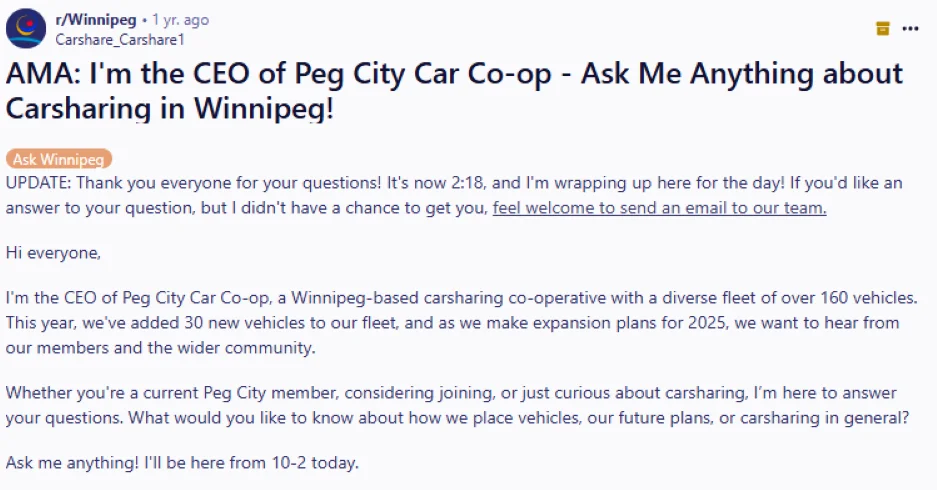
Ask-me-anything (AMA) events are a great way to drum up questions and content ideas on Reddit.
7. Use lead magnets
Ideally, you want to turn content viewers into leads. One proven way to do that is by using lead magnets.
A lead magnet is a free piece of valuable content or offer (like an ebook or template) that a business gives away in exchange for a person’s contact information, usually an email address, to generate leads.

Try adding lead magnets to a pop-up that triggers when someone scrolls partway down a blog post. Tie the offer into the topic if possible (like offering a yard maintenance calendar on a blog post about growing grass).
8. Repurpose content for more reach
Creating content takes time. You can multiply the return on a piece of content by repurposing it for use on several channels.
There are few limitations to how you do this. A single interview with an industry expert can become clips you share on social media, a long-form blog post, quotes for your next annual report, and fodder for getting featured in industry publications.
9. Mention your products thoughtfully
Nothing will lose trust faster than being overtly salesy when someone expects an unbiased answer to their question. But that doesn’t mean you can’t ever mention what you sell. You just have to be strategic in how you do it.
For example, it’s perfectly acceptable to include your product in a roundup of the best options in your category. It’s also fine to share a screenshot of what you sell if it fits in the narrative of your post. Just don’t promise a list of tips and make them all about your product.
10. Make the most of your content evergreen
In content marketing, evergreen content is material that remains valuable and relevant over time. It continues to attract traffic, engagement, and leads long after it’s published.
An example of an evergreen content post would be a guide to fixing a leaky faucet or creating a personal budgeting spreadsheet.

By contrast, time-sensitive content would be a news article about a one-time event in your industry or a list of timely trends.
Both are useful in a content strategy, but evergreen content delivers the best return over its lifetime.
11. Use AI wisely
AI tools have advanced at a rapid rate, and they’re now capable of spinning up entire blog posts and even videos in a matter of seconds. That challenge with letting it do so is that it can also do it for every one of your competitors just as easily. Which means your AI content will look an awful lot like theirs.
To get the efficiency benefits of AI without churning out copycat content, think of it like an assistant and a creative sparring partner instead of a writer or videographer.
Here are several ways you can use AI to create better content faster:
- Summarize: Ask AI to provide key insights from a long video transcript or call recording.
- Suggest: Prompt your AI to suggest alternative titles, captions, or a starter outline you can riff off of.
- Scrutinize: Feed a piece of content to your AI tool and have it review for missing subtopics, logic gaps, or spelling errors.
- Survey: Give AI a large dataset and ask it to identify common themes or insights that can be turned into blog post topics.
12. Start optimizing for AI search engines
AI is taking over search in a big way. People are using platforms like ChatGPT, Perplexity, and Gemini to find answers. And Google’s own AI Overviews are showing up on more results pages.
On one hand, that means less traffic being referred to your website from traditional search engine results. On the other hand, there’s a growing opportunity to generate referral traffic directly from these AI platforms.
Much of what you do for SEO will help you get cited by AI. So go all in optimizing for Google’s E-E-A-T signals, target conversational queries, and try to earn more brand mentions on other websites.
On top of that, look at how each platform responds to your target keywords. Check how they autofill suggestions and take note of what related questions they suggest.
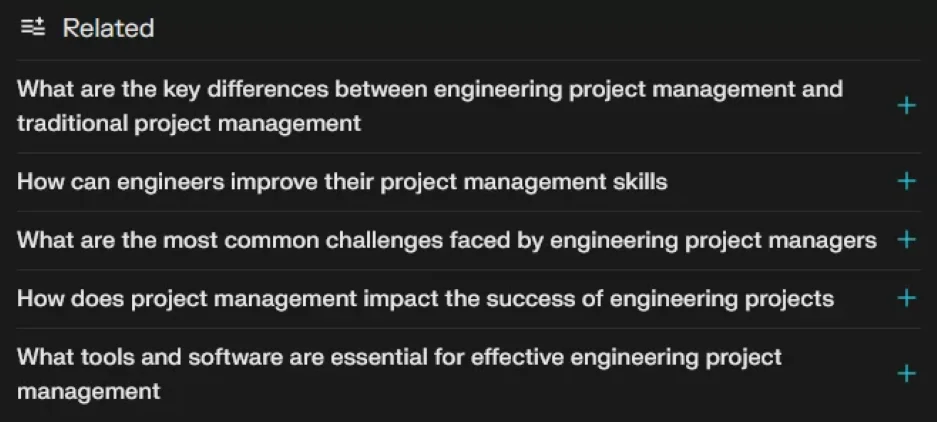
Perplexity’s related questions
13. Update old content
Over time, some of the assets you create will fall out of date, lose search rankings, and stop pulling in new visitors. They aren’t dead; they’re actually a shortcut to boosting traffic.
Run a search on GA4 or your favorite SEO tool to find content that’s no longer performing. If it’s an evergreen post, look for ways to bring it back to life. Update links, include new data, and ID any informational gaps it’s not currently addressing.
14. Use lots of original quotes and data
Original insights and data are a magic pill of success in content marketing. They get cited by AI, help add authority for SEO, and help generate lots of media buzz and backlinks.
You don’t need to commission a huge survey of your industry to generate new data (but do so if you can!). Try these options instead:
- Interview internal and external experts for original insights and quotes.
- Post a quick poll on social media.
- Anonymize data about your customer base and share it.
- Run experiments that test ideas from industry experts.
Best tools for content marketing
There are many tools to help you come up with new ideas, create content, distribute it, and track your progress. Here are a few to get you started.
ChatGPT for content creation
ChatGPT is an all-around AI tool for marketing. One of its many uses is as an AI copywriting platform.
Use it to break through mental blocks, dig up recent statistics, and suggest hypothetical examples you can fold into your content.
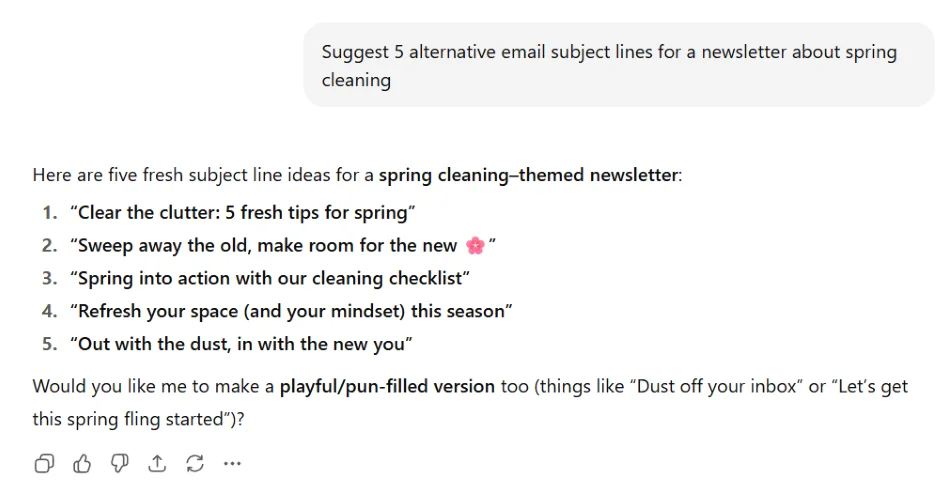
WordStream’s Free Keyword Tool
Finding the perfect keyword to target can eat up a lot of valuable time. Our Free Keyword Tool makes the process a lot faster.
Just enter a general keyword idea you think might be a good topic for your content. The Keyword Tool will return a list of ideas along with their search volume and competition level.

Freepik for AI images
There are dozens of AI image generators to choose from, and most of them are pretty good. One of the options recently recommended to us by an experienced designer and marketer is Freepik.

Freepik gives you a lot of flexibility and features for its low cost. It comes with editing tools, stock assets, and is built on several of the best AI models.
Mailchimp for email
Email has one of the best returns on investment compared to other marketing channels. It’s also an excellent platform for repurposing content.
Mailchimp is one of the original players in automated email marketing and is still an excellent option for small and growing businesses.

With MailChimp, you build and manage your email list, create complex automated email campaigns, and track all the important KPIs.
Content marketing FAQs
Got more questions about content marketing? We’ve got answers!
Is it really worth doing content marketing?
Yes, content marketing is still one of the most effective ways to grow a business. Trust is only becoming more important in the buying decision, and content helps you build it. Plus, content marketing is a great way to get found on more AI search results, so it’ll remain relevant in the future.
What are the key content marketing characteristics?
The four characteristics of content marketing are audience-focused, value-first, long-term, and relationship-driven. Together, these traits explain why it remains so effective. Content that solves real problems, builds trust over time, and strengthens customer relationships will consistently deliver valuable returns.
What are the three C’s of content marketing?
The three C’s of content marketing are creation, curation, and conversation. You create original content that showcases your expertise, curate relevant resources that add extra value for your audience, and spark conversations that build trust and lasting relationships.
What is the main goal of content marketing?
The main goal of content marketing is to attract, engage, and convert an audience by providing valuable, relevant information that builds trust and drives profitable customer action over time.
How is content marketing different from traditional advertising?
Content marketing differs from traditional advertising because it focuses on delivering helpful, relevant information that audiences seek out, while traditional advertising usually interrupts people with promotional messages. Instead of pushing products directly, content marketing builds long-term trust and relationships, making it less about quick sales and more about sustained customer loyalty.
How do I start content marketing?
You can start content marketing by first defining your target audience and goals, then building a strategy around the types of content that will serve them best (such as blogs, videos, emails, etc.). From there, research keywords, create a content calendar, and publish consistently, while promoting your work through the right channels and measuring results to refine your approach.
Grow with content marketing
There are dozens of types of content marketing and many ways to leverage each one. It’s easy to get bogged down with the options.
Our best advice is to start small by simply sharing your knowledge on the platforms with which you’re most comfortable. If you’re a divorce lawyer who loves TikTok, post a few videos explaining the biggest challenges of navigating a legal separation.
You can turn them into blog posts or Instagram Reels later. But for now, just get your brilliance out into the world and watch more people turn to you for answers.







